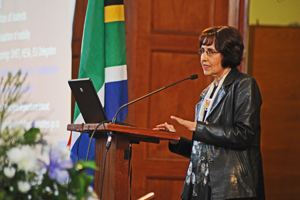EU, SA join forces for new postgrad deal
22 August 2011 Welcome: EU officer Berine Kramer addresses South Africa's first Erasmus Mundus scholarship beneficiaries.
Welcome: EU officer Berine Kramer addresses South Africa's first Erasmus Mundus scholarship beneficiaries.
It's a catch-22 situation: South Africa's shortage of academics with PhDs means that not enough PhD researchers can be graduated to ease the shortage.
This quandary, says Mahlubi Mabizela, chief director of university policy at the Department of Higher Education and Training, was the motivation behind the launch of the Erasmus Mundus Academic Mobility Scholarship Programme in South Africa, in partnership with the European Union (EU).
UCT hosted the country's first Erasmus Mundus national pre-departure event on 5 August, attended by over 100 scholarship recipients from across the country, who will be on their way to universities across Europe in the next few months as part of their PhD and master's degree studies.
"This is an historic first," said Berine Kramer, social sectors programme officer of the EU Delegation to South Africa. "We're making this road for subsequent generations by walking it."
Kramer explained that the event was being hosted at UCT because this was in line with Higher Education and Training Minister Blade Nzimande's view that all university-related events should take place at a university; and because the majority of beneficiaries hail from the four Cape universities. "This, I hope, will be seen as a challenge to be taken up by the north."
Mabizela explained that the scholarship programme had specific targets: it should largely benefit previously disadvantaged institutions, boost the output of postgraduates, build and strengthen partnerships, and promote skills transfer.
"I hope that this programme will translate into 'degrees with currency'," he said.
UCT deputy vice-chancellor Professor Thandabantu Nhlapo urged the scholarship recipients to stay in touch with each other, and to remain a visible part of the programme that will benefit future generations and the African continent.
 This work is licensed under a Creative Commons Attribution-NoDerivatives 4.0 International License.
This work is licensed under a Creative Commons Attribution-NoDerivatives 4.0 International License.
Please view the republishing articles page for more information.










